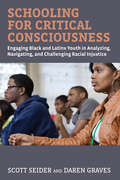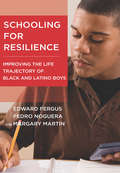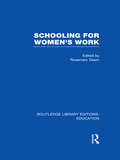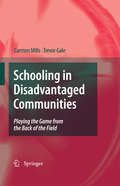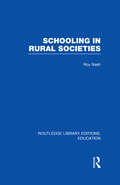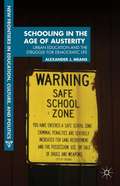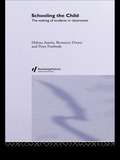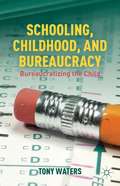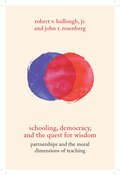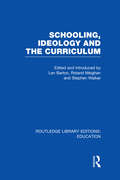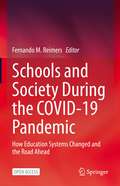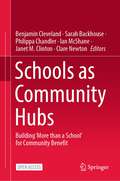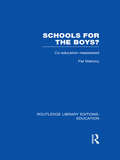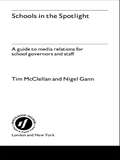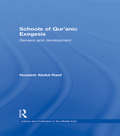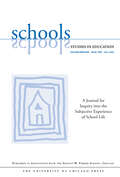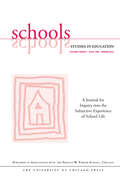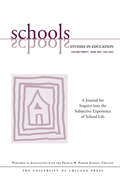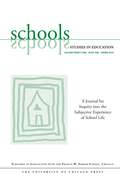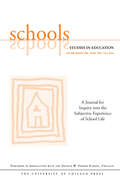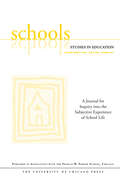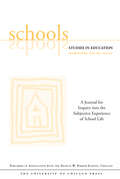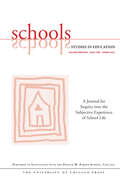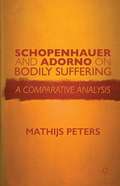- Table View
- List View
Schooling for Critical Consciousness: Engaging Black and Latinx Youth in Analyzing, Navigating, and Challenging Racial Injustice
by Scott Seider Daren GravesSchooling for Critical Consciousness addresses how schools can help Black and Latinx youth resist the negative effects of racial injustice and challenge its root causes. Scott Seider and Daren Graves draw on a four-year longitudinal study examining how five different mission-driven urban high schools foster critical consciousness among their students. The book presents vivid portraits of the schools as they implement various programs and practices, and traces the impact of these approaches on the students themselves. The authors make a unique contribution to the existing scholarship on critical consciousness and culturally responsive teaching by comparing the roles of different schooling models in fostering various dimensions of critical consciousness and identifying specific programming and practices that contributed to this work. Through their research with more than 300 hundred students of color, Seider and Graves aim to help educators strengthen their capacity to support young people in learning to analyze, navigate, and challenge racial injustice.Schooling for Critical Consciousness provides school leaders and educators with specific programming and practices they can incorporate into their own school contexts to support the critical consciousness development of the youth they serve.
Schooling for Resilience: Improving the Life Trajectory of Black and Latino Boys (Youth Development and Education Series)
by Pedro Noguera Edward Fergus Margary MartinAs a group, Black and Latino boys face persistent and devastating disparities in achievement when compared to their White counterparts: they are more likely to obtain low test scores and grades, be categorized as learning disabled, be absent from honors and gifted programs, and be overrepresented among students who are suspended and expelled from school. They are also less likely to enroll in college and more likely to drop out. Put simply, they are among the most vulnerable populations in our schools.Schooling for Resilience investigates how seven newly formed schools, created specifically to serve boys of color, set out to address the broad array of academic and social problems faced by Black and Latino boys. Drawing on student and teacher surveys, focus groups, interviews, and classroom observations, the authors investigate how these schools were developed, what practices they employed, and how their students responded academically and socially. In particular, they focus on the theory of action that informed each school&’s approach to educating Black and Latino boys and explore how choices about school structure and culture shaped students&’ development and achievement. In doing so, the authors identify educational strategies that all schools can learn from. This thoughtful, passionately argued volume promises to influence efforts to improve the achievement and life outcomes of Black and Latino boys for years to come.
Schooling for Women's Work (Routledge Library Editions: Education)
by Rosemary DeemThis collection of original papers shows how women in Britain are still being discriminated against during schooling, despite the existence of legislation prohibiting such discrimination and despite apparent concern with promoting equality between the sexes in education. Focusing on the current situation and experiences of women in education and their subsequent entry to, and experiences of, the labour market, the book shows how the category of gender is made relevant in the education of women: how it is influential in structuring their actions, beliefs, values and life chances, and how it provides them with a set of contradictions about their role in society.
Schooling in Disadvantaged Communities
by Carmen Mills Trevor GaleBased on a study of one secondary school located in a disadvantaged community in Australia, this book provides a different perspective on what it means to 'play the game' of schooling. Drawing on the perspectives of teachers, parents and students, this book is a window through which to explore the possibilities of schooling in disadvantaged communities. The authors contend that teachers, parents and students themselves are all involved in the game of reproducing disadvantage in schooling, but similarly, they can play a part in opening up opportunities for change to enhance learning for marginalised students. Rather than only attempting to transform students, teachers should be also be concerned to transform schooling; to provide educational opportunities that transform the life experiences of and open up opportunities for all young people, especially those disadvantaged by poverty and marginalised by difference. The book is also designed to stimulate understanding of the work of Bourdieu as well as of a Bourdieuian approach to research. Seeing transformative potential in his theoretical constructs, it airs the possibility that schools can be more than mere reproducers of society.
Schooling in Rural Societies (Routledge Library Editions: Education)
by Roy NashIn industrialized societies the needs of people living in remote and sparsely populated areas are easily overlooked, whilst in developing countries the needs of the rural population are at once so obvious and so enormous that our practical concern is blunted. In this volume it is clearly demonstrated that the relationship between environment and schooling is no less pertinent in rural areas than urban areas, although most recent attention has been directed towards the latter. Roy Nash seeks to redress the balance and in this wide-ranging and comprehensive analysis he examines the educational needs of rural people both in the declining periphery of urban Europe and in the resource-starved areas of the developing world.
Schooling in the Age of Austerity: Urban Education And The Struggle For Democratic Life (New Frontiers In Education, Culture And Politics Ser.)
by Alexander J. MeansThrough a case study in a Chicago public school, Means demonstrates that, despite the fragmentation of human security in low-income and racially segregated public schools, there exist positive social relations, knowledge, and desire for change that can be built upon to promote more secure and equitable democratic futures for young people.
Schooling the Child: The Making of Students in Classrooms
by Peter Freebody Helena Austin Bronwyn DwyerWhat is a child?How is the concept of childhood defined?This book aims to explore these perennial and complex questions by looking at the way in which society constructs and understands childhood. The authors focus in particular on the school, a key location within which social and cultural notions of childhood are defined and performed.The book is divided into three major parts:Part 1 frames the accepted notions of childhood and schooling, and introduces ethnomethodological analysis as a tool to rethink current versions of the child.Part 2 focuses on how school students become members of a category within the institution of the classroom. The authors explore this idea through transcripts of talk between teachers and students, and amongst students themselves in two classroom studies.Part 3 looks at the materials of education, concentrating specifically on children's texts. The authors examine how such texts portray a notion of the child within the story, and also assume a notion of the child as reader of the story.This important book shows how much is at stake for children in accepting adults' deep-seated notions of childhood. It will be of great interest to educational researchers and policy makers, sociologists of childhood, teachers and student teachers.
Schooling, Childhood, and Bureaucracy
by Tony WatersIn exploring the relationship between bureaucratic schooling and the individual child, Waters describes the persistence of educational inequality, child development, and the nature of bureaucracy. The conclusions point out how education bureaucracies frame both schooling and childhood as they relentlessly seek to create ever more perfect children.
Schooling, Democracy, and the Quest for Wisdom: Partnerships and the Moral Dimensions of Teaching
by Robert V Bullough John R RosenbergIn response to growing concern in the 1980s about the quality of public education across the United States, a tremendous amount of energy was expended by organizations such as the Holmes Group and the Carnegie Forum to organize professional development schools (PDS) or “partner schools” for teacher education. On the surface, the concept of partnering is simple; however, the practice is very costly, complex, and difficult. In Schooling, Democracy, and the Quest for Wisdom, Robert V. Bullough, Jr. and John R. Rosenberg examine the concept of partnering through various lenses and they address what they think are the major issues that need to be, but rarely are, discussed by thousands of educators in the U.S. who are involved and invested in university-public school partnerships. Ultimately, they assert that the conversation around partnering needs re-centering (most especially on the purposes of public education), refreshing, and re-theorizing.
Schooling, Ideology and the Curriculum (Routledge Library Editions: Education)
by Stephen Walker Len Barton Roland MeighanAlthough the different contributions to this book range over a wide spectrum of substantive issues, they share a common interest. This is a concern to explore the ways in which notions of the relations between theory and practice, between belief and action, can be used to develop three kinds of sensitivity in the sociology of education. A sensitivity towards how school systems are created, maintained and made to function; towards developing a more refined, critical and constructive awareness of the reliability and validity of descriptions, analyses and explanations offered in this field of study; and a sensitivity towards the ways in which changes take place within the education system and how the insights and realisations generated in the discipline might be used to control such occurrences.
Schools and Society During the COVID-19 Pandemic: How Education Systems Changed and the Road Ahead
by Fernando M. ReimersThis open access book provides an analysis of the effects of the COVID-19 Pandemic on diverse education systems, and of the results of the policies adopted to sustain educational opportunities. Through a series of diverse national case studies, the book examines the preexisting fragilities and vulnerabilities in educational structures which shaped the nature of the varied responses, around the world, to teaching and learning during the worst crisis in public education in recent history.The chapters in the book take stock of how educational opportunities changed in various education systems around the world as a result of the Covid-19 pandemic, answering the question of what did education systems, and societies, learn about education as a result of the pandemic.The book covers diverse education systems, with varying levels of resources and facing distinct education challenges, including Brazil, Chile, Finland, Japan, Mexico, Norway, Portugal, Russia, Singapore, Spain, South Africa, and the United States.
Schools as Community Hubs: Building ‘More than a School’ for Community Benefit
by Benjamin Cleveland Ian McShane Sarah Backhouse Philippa Chandler Janet M. Clinton Clare NewtonThis open access book brings together research on the planning, design, governance and management of schools as community hubs—places that support the development of better-connected, more highly integrated, and more resilient communities with education at the centre. It explores opportunities and difficulties associated with bringing schools and communities closer together, with a focus on the facilities needed to accommodate shared experiences that generate social capital and deliver reciprocal benefits.This book discusses the expanded roles of schools, and investigates how schools may offer more to their communities—historically, currently and into the future—with respect to the role of the built environment in situating community activities and services.Organised around four sections, it showcases important areas of development in the field via an interdisciplinary approach, which weaves together empirical research with theoretical insights and practical examples. This book not only highlights the challenges associated with the development of schools as community hubs but offers evidence-based insights into how to overcome such hurdles to develop community-facing schools into the future.
Schools for the Boys?: Co-education reassessed (Routledge Library Editions: Education)
by Pat MahonyDo girls do better in single-sex or co-educational schools? Up to now, discussion has centred on girls’ academic achievements in single or mixed-sex groups, but Pat Mahony’s research clearly demonstrates that this is not the only issue, and that co-education is damaging for girls socially as well as academically. She challenges the argument that co-education is desirable because it is more normal. Her research reveals that it is normal for girls to be ‘put down’ in class, to be verbally abused and sexually harassed by boys, and yes, this will be their ‘normal’ experience as women. But does this justify the way girls are treated in schools? Pat Mahony goes on to explore some of the reasons behind this state of affairs and suggests that the answer lies in sexual politics, not biology. The book concludes with practical suggestions for bringing about change in schools, including case-studies from existing projects.
Schools in the Spotlight: A Guide to Media Relations for School Governors and Staff
by Nigel Gann Mr Nigel Gann Tim McClellan Tim McclellanWhat role does a school play in a community and society?This book examines the need for educational establishments to review their position in the local community and to develop strategies to deal with the management of their image. Increasing parental choice means that schools must begin to adopt marketing concepts and tell people what is happening both inside and outside the classroom.Techniques to generate, revisit and challenge a school's ethos are discussed together with ways of getting this message across to the wider community. Effective management of a school's image through judicious handling of the media can lead to better results, higher self-esteem for staff and pupils and a greater recognition of a school's contribution to a local community.This book gives practical guidance on how to identify potential news items and how to convince local newspapers, television and radio organisations to use the story. The book contains many examples of how schools have put comprehensive framework to effective media communication and how to avoid potential pitfalls.
Schools of Qur'anic Exegesis: Genesis and Development (Culture and Civilization in the Middle East)
by Hussein Abdul-RaofQur’anic exegesis has become the battleground of political Islam and theological conflict among various Muslim schools of thought. Using comparative and contrastive methodology, examples from the Qur'an are investigated in the light of various theological views to delineate the birth, development and growth of Qur'anic exegesis. The political status quo, in the past and at present, has impinged upon Qur’anic exegesis more than on any other discipline in Islamic studies. This book illustrates the dichotomy between mainstream and non-mainstream Islam, showing how Qur’anic exegesis reflects the subtle dogmatic differences and political cleavages in Islamic thought. Chapters explore in depth the intrusive views of the compilers of early exegesis manuscripts, the scepticism among Western scholars about the authenticity of early Muslim works of exegesis and of prophetic tradition, and the role of exegesis as a tool to reaffirm the Qur’an as a canon. Written to appeal to those with comparative exegetical interests as well as those focused on Islamic studies in general, this book will be an important reference for research students, scholars, and students of Islamic Studies, Theology, Religious studies and Middle Eastern Studies.
Schools, volume 19 number 2 (Fall 2022)
by SchoolsThis is volume 19 issue 2 of Schools. Schools: Studies in Education provides a forum for classroom educators to describe and meditate on the complex experiences of school life. The journal publishes scholarly articles, reflective essays, and stories that convey how human relationships, thoughts, and emotions shape the meaning of what happens when learning actually occurs. Historical documents in “From the Archives” feature intriguing excerpts from works that provide insight into contemporary issues. Opinion pieces in “On the Horizon” feature arguments about the future of education planning and policy. Reviews critically evaluate books, films, art exhibitions, concerts, and other events that have some bearing on the meaning and value of education.
Schools, volume 20 number 1 (Spring 2023)
by SchoolsThis is volume 20 issue 1 of Schools. Schools: Studies in Education provides a forum for classroom educators to describe and meditate on the complex experiences of school life. The journal publishes scholarly articles, reflective essays, and stories that convey how human relationships, thoughts, and emotions shape the meaning of what happens when learning actually occurs. Historical documents in “From the Archives” feature intriguing excerpts from works that provide insight into contemporary issues. Opinion pieces in “On the Horizon” feature arguments about the future of education planning and policy. Reviews critically evaluate books, films, art exhibitions, concerts, and other events that have some bearing on the meaning and value of education.
Schools, volume 20 number 2 (Fall 2023)
by SchoolsThis is volume 20 issue 2 of Schools. Schools: Studies in Education provides a forum for classroom educators to describe and meditate on the complex experiences of school life. The journal publishes scholarly articles, reflective essays, and stories that convey how human relationships, thoughts, and emotions shape the meaning of what happens when learning actually occurs. Historical documents in “From the Archives” feature intriguing excerpts from works that provide insight into contemporary issues. Opinion pieces in “On the Horizon” feature arguments about the future of education planning and policy. Reviews critically evaluate books, films, art exhibitions, concerts, and other events that have some bearing on the meaning and value of education.
Schools, volume 21 number 1 (Spring 2024)
by SchoolsThis is volume 21 issue 1 of Schools. Schools: Studies in Education provides a forum for classroom educators to describe and meditate on the complex experiences of school life. The journal publishes scholarly articles, reflective essays, and stories that convey how human relationships, thoughts, and emotions shape the meaning of what happens when learning actually occurs. Historical documents in “From the Archives” feature intriguing excerpts from works that provide insight into contemporary issues. Opinion pieces in “On the Horizon” feature arguments about the future of education planning and policy. Reviews critically evaluate books, films, art exhibitions, concerts, and other events that have some bearing on the meaning and value of education.
Schools, volume 21 number 2 (Fall 2024)
by SchoolsThis is volume 21 issue 2 of Schools. Schools: Studies in Education provides a forum for classroom educators to describe and meditate on the complex experiences of school life. The journal publishes scholarly articles, reflective essays, and stories that convey how human relationships, thoughts, and emotions shape the meaning of what happens when learning actually occurs. Historical documents in “From the Archives” feature intriguing excerpts from works that provide insight into contemporary issues. Opinion pieces in “On the Horizon” feature arguments about the future of education planning and policy. Reviews critically evaluate books, films, art exhibitions, concerts, and other events that have some bearing on the meaning and value of education.
Schools, volume 22 number 1 (Spring 2025)
by SchoolsThis is volume 22 issue 1 of Schools. Schools: Studies in Education provides a forum for classroom educators to describe and meditate on the complex experiences of school life. The journal publishes scholarly articles, reflective essays, and stories that convey how human relationships, thoughts, and emotions shape the meaning of what happens when learning actually occurs. Historical documents in “From the Archives” feature intriguing excerpts from works that provide insight into contemporary issues. Opinion pieces in “On the Horizon” feature arguments about the future of education planning and policy. Reviews critically evaluate books, films, art exhibitions, concerts, and other events that have some bearing on the meaning and value of education.
Schools: Studies in Education, volume 18 number 2 (Fall 2021)
by Schools: Studies in EducationThis is volume 18 issue 2 of Schools: Studies in Education. Schools: Studies in Education provides a forum for classroom educators to describe and meditate on the complex experiences of school life. The journal publishes scholarly articles, reflective essays, and stories that convey how human relationships, thoughts, and emotions shape the meaning of what happens when learning actually occurs. Historical documents in “From the Archives” feature intriguing excerpts from works that provide insight into contemporary issues. Opinion pieces in “On the Horizon” feature arguments about the future of education planning and policy. Reviews critically evaluate books, films, art exhibitions, concerts, and other events that have some bearing on the meaning and value of education.
Schools: Studies in Education, volume 19 number 1 (Spring 2022)
by Schools: Studies in EducationThis is volume 19 issue 1 of Schools: Studies in Education. Schools: Studies in Education provides a forum for classroom educators to describe and meditate on the complex experiences of school life. The journal publishes scholarly articles, reflective essays, and stories that convey how human relationships, thoughts, and emotions shape the meaning of what happens when learning actually occurs. Historical documents in “From the Archives” feature intriguing excerpts from works that provide insight into contemporary issues. Opinion pieces in “On the Horizon” feature arguments about the future of education planning and policy. Reviews critically evaluate books, films, art exhibitions, concerts, and other events that have some bearing on the meaning and value of education.
Schopenhauer A Biography
by David E. CartwrightArthur Schopenhauer (1788-1860) was one of the most original and provocative thinkers of the nineteenth century. He spent a lifetime striving to understand the meaning of living in a world where suffering and death are ubiquitous. In his quest to solve "the ever-disquieting riddle of existence," Schopenhauer explored almost every dimension of human existence, developing a darkly compelling worldview that found deep resonance in contemporary literature, music, philosophy, and psychology. This is the first comprehensive biography of Schopenhauer written in English. Placing him in his historical and philosophical contexts, David E. Cartwright tells the story of Schopenhauer's life to convey the full range of his philosophy. He offers a fully documented portrait in which he explores Schopenhauer's fractured family life, his early formative influences, his critical loyalty to Kant, his personal interactions with Fichte and Goethe, his ambivalent relationship with Schelling, his contempt for Hegel, his struggle to make his philosophy known, and his reaction to his late-arriving fame. The Schopenhauer who emerges in this biography is the complex author of a philosophy that had a significant influence on figures as diverse as Samuel Beckett, Jorge Luis Borges, Emile Durkheim, Sigmund Freud, Thomas Hardy, Thomas Mann, Friedrich Nietzsche, and Ludwig Wittgenstein.
Schopenhauer and Adorno on Bodily Suffering
by Mathijs PetersPeters discusses Schopenhauer and Adorno, two philosophers whose writings have hitherto not been extensively compared in the English-speaking academic world. Focusing on their ideas about pain and bodily suffering, the author creates a stimulating tension between the ahistorical nature of Schopenhauer's philosophy and the deeply historical character of Adorno's critical analyses. He explores the common themes in their work, in that both have been accused of defending pessimistic theories, in which the notion of freedom disappears and is replaced by an emphasis on metaphysical and social determination. Without overlooking the differences between the two authors, Peters argues that Schopenhauer and Adorno's pessimism is intertwined with hopeful analyses of compassion with bodily suffering, the redeeming qualities of the arts, and descriptions of experiences of a metaphysical nature. His fascinating study enhances our understanding of Schopenhauer and Adorno and the former's influence on Critical Theory. It furthermore is a valuable contribution to our ideas about pessimism, optimism and social critique.
